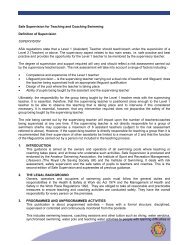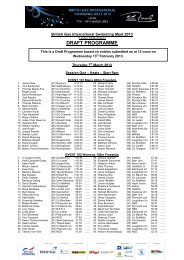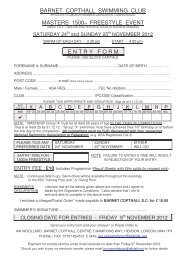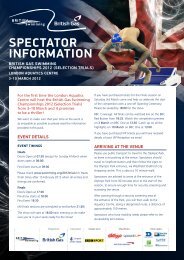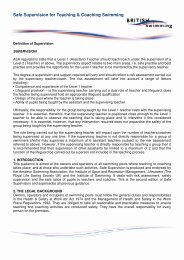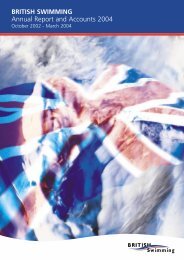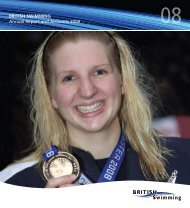Inclusion of Swimmers with a Disability - Swimming.Org
Inclusion of Swimmers with a Disability - Swimming.Org
Inclusion of Swimmers with a Disability - Swimming.Org
Create successful ePaper yourself
Turn your PDF publications into a flip-book with our unique Google optimized e-Paper software.
<strong>Disability</strong> Access<br />
The <strong>Disability</strong> Discrimination Act 1995<br />
(DDA 1995) is a UK Parliamentary Act,<br />
which makes it unlawful to discriminate<br />
against people in respect <strong>of</strong> their<br />
disabilities in relation to employment,<br />
the provision <strong>of</strong> goods and services,<br />
education and transport.<br />
l This act has been, and will be, altered<br />
in the future <strong>with</strong> the aim <strong>of</strong> making<br />
services and provisions available to<br />
everyone. Current legislation needs<br />
to be considered when any plans for<br />
inclusion are being made to gain the<br />
best possible provision.<br />
In practice this means that new facilities<br />
should incorporate the ideal. Older<br />
facilities require innovative ways <strong>of</strong><br />
making access easier.<br />
Awareness <strong>of</strong> Issues Relating to<br />
Health & Safety, Assisting and<br />
Handling<br />
Risk assessment is the key to all safety,<br />
assisting and handling activities in the<br />
swimming pool environment relating to<br />
both people and equipment. Assistants<br />
need to be familiar <strong>with</strong> mechanical<br />
lifting aids, so they can use them safely.<br />
All risk assessments and training must<br />
be recorded.<br />
Some Common Sense Principles<br />
l <strong>Swimmers</strong> <strong>with</strong> disabilities <strong>of</strong>ten<br />
need help to participate but avoid<br />
lifting wherever possible.<br />
l Always encourage people <strong>with</strong><br />
disabilities to help themselves and<br />
teach them how to do so.<br />
l Make use <strong>of</strong> swimmers own arm<br />
and leg strength.<br />
l Make use <strong>of</strong> graduated steps,<br />
sliding boards, shower chairs, etc.<br />
l Some swimmers will need assisting<br />
but always think, plan and prepare<br />
before you assist.<br />
l Assist for the shortest possible<br />
distance.<br />
l Be aware <strong>of</strong> rough surfaces which<br />
may cause abrasions.<br />
There may be occasions when manual<br />
handling cannot be avoided. Always<br />
discuss, plan and prepare before you<br />
assist.<br />
Before Assisting and Handling<br />
think about:<br />
l the TASK<br />
l the INDIVIDUAL<br />
l the LOAD<br />
l the ENVIRONMENT.<br />
Extra considerations<br />
l Ensure that any participants <strong>with</strong><br />
balance problems are <strong>of</strong>fered<br />
assistance when walking on a wet<br />
poolside.<br />
l <strong>Swimmers</strong> <strong>with</strong> lower limb impairment<br />
may need assistance/prosthesis<br />
needed near poolside/alternative<br />
assistant (chair, skateboard etc).<br />
l Take care when a participant <strong>with</strong><br />
paraplegia or those <strong>with</strong> minimum<br />
control <strong>of</strong> their lower limbs are<br />
entering the water as abrasions,<br />
that take a long time to heal, may<br />
be caused.<br />
l Park wheelchairs parallel to the pool<br />
and ensure that the brakes are on.<br />
l Be aware <strong>of</strong> swimmers who may have<br />
seizures. 1:1 spotters are required for<br />
epileptics. The ASA has a protocol for<br />
competitive epileptic swimmers.<br />
l Walk on the water side <strong>of</strong> the pool<br />
when assisting someone.<br />
Safety <strong>of</strong> swimmer and helper is <strong>of</strong><br />
paramount importance. Ask for help<br />
or further training if in doubt.<br />
Teaching and Learning<br />
There is an ever-growing involvement<br />
<strong>of</strong> people <strong>with</strong> disabilities in teaching<br />
classes and swimming club provision.<br />
There is still a place for alternative<br />
arrangements either long term or on<br />
a temporary basis. Provision may be:<br />
l fully integrated<br />
l included and supported<br />
l separate provision.<br />
The swimming programme, the time<br />
and the content will have a bearing on<br />
an individual’s choice. This choice may<br />
be associated <strong>with</strong> personal preference,<br />
interests and staffing e.g. beginners,<br />
improvers, recreation, swim for health,<br />
competition and other aquatic<br />
disciplines.<br />
Assessment <strong>of</strong> Need<br />
Determining the specific needs <strong>of</strong> any<br />
participant is an essential pre-requisite<br />
to his/her successful involvement in any<br />
swimming session or club. These may<br />
be determined by:<br />
l direct consultation <strong>with</strong> the individual<br />
and parent or carer<br />
l swimming background<br />
l completion <strong>of</strong> Club registration<br />
forms<br />
l observation <strong>of</strong> the swimmers ability in<br />
the water<br />
l age.<br />
Should the group not be able to provide<br />
for the specific needs, the swimmer<br />
should be given contact information and<br />
directed to another more appropriate<br />
provision. Local knowledge is invaluable<br />
at this time as well as advice from the<br />
Governing Body.<br />
Constant monitoring <strong>of</strong> progress should<br />
take place and achievement <strong>of</strong> goals<br />
should be reviewed on a regular basis.<br />
3



